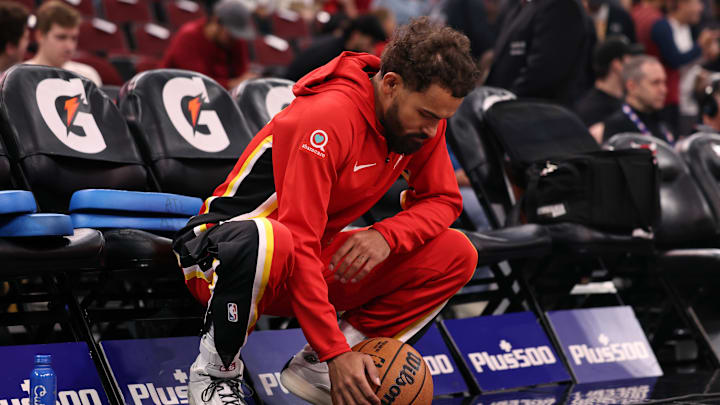The Atlanta Hawks are sprinting toward a realization about Trae Young that will go a long way toward defining the trajectory of the organization. Months after opting against extending the franchise player, Atlanta is thriving with him on the sidelines.
A small sample size of games aren't enough to justify trading the face of the franchise, but the Hawks are running out of reasons to ignore how quickly an up-and-coming team is outgrowing its star.
Young has missed nine games early in the 2025-26 season and played just seven minutes during the outing in which he was injured. Including the game he was hurt, Atlanta has gone 7-3 without the franchise player and quietly emerged as one of the most balanced teams in the NBA.
The result has been many contemplating the notion that the Hawks play better team basketball without Young, even if they aren't necessarily a stronger unit by simply removing him from the equation.
Young is a polarizing figure, but Hawks fans know as well as anyone just how capable he is of generational performances. He led Atlanta to the 2021 Eastern Conference Finals and has four All-Star Game appearances on his résumé at just 27 years of age.
Fit is even more important than talent in the NBA, however, and the evidence is piling up that Young is no longer an ideal match for the current core.
Hawks are outgrowing Trae Young and his preferred style of play
It'd be simple enough to state that the Hawks are 6-3 in nine games without Young and hope that proves a point. The progress Atlanta has made in his absence, however, ranges far beyond wins and losses, and instead touches upon a drastic shift in ideology.
The ball is moving more freely, shots and touches aren't being consumed by any one player in particular, and the quality of defense has greatly improved.
Since Young's last game, the Hawks have ranked No. 1 in the NBA in assists and No. 9 in passes made. For a team that lost the reigning league leader in assists per game, it's staggering how quickly they've adjusted by emphasizing team above all else.
For perspective: Atlanta ranked No. 2 in the Association in assists when Young led the NBA in the statistic in 2024-25, but ranked No. 17 in passes made at 281.8—18.4 fewer than its average without him.
That's indicative of how the Hawks have embraced a more team-oriented approach with one of the more ball-dominant players in the NBA sidelined. Young deserves credit for decreasing his usage rate over each of the past four seasons, but his inefficiency fails to provide ideal balance in that regard.
Since his All-NBA season in 2021-22, Young has shot at a surprisingly subpar clip of .422/.346/.873—an arguable sign of his need for volume that doesn't necessarily fit Atlanta's current framework.
Hawks are playing more freely on offense, defending at much higher level
Even if Young manages to perfectly adapt on offense, a mountain-sized hurdle remains on the defensive end of the floor. He played with more energy and intent on defense in 2024-25, and perhaps that trend will continue, but he remains a net negative in that regard.
That's never been more evident than since he's been out, as Atlanta ranks No. 4 in the NBA in defensive rating since Young's most recent appearance.
It should be noted that Atlanta has greatly improved its roster over the past four months, thus marking any progress without Young with an asterisk. His style of play simply isn't the ideal fit it once seemed to be, however, and the Hawks must come to terms with that possibility.
With a young and promising roster that's actively developing players in volume roles, bringing back a ball-dominant point guard who struggles on defense may not be the wisest decision.
